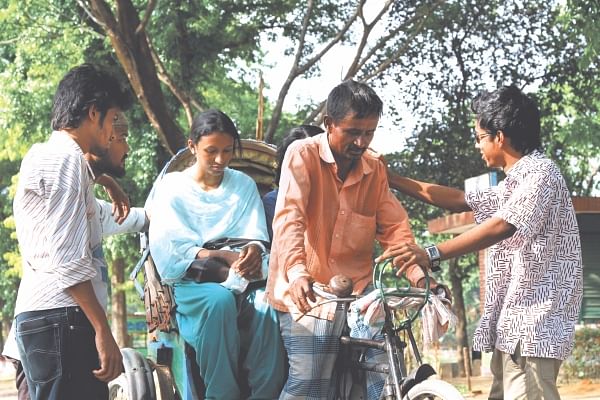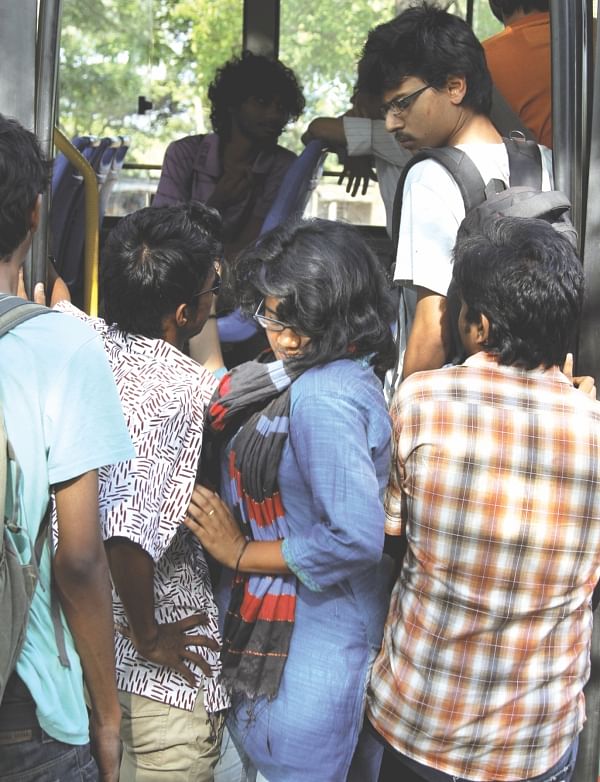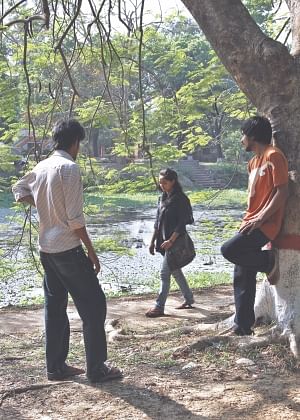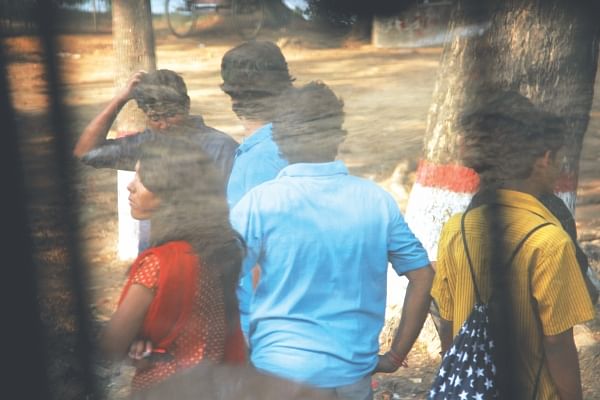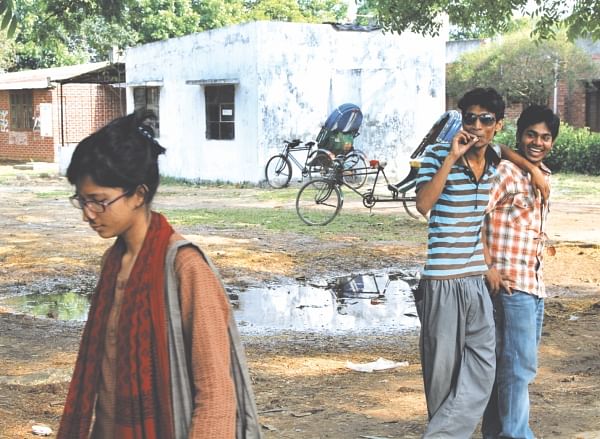| Home - Back Issues - The Team - Contact Us |
 |
| Volume 11 |Issue 16 | April 20, 2012 | |
|
|
Cover Story
An Unpunished Violation 'Eve teasing' is a euphemised term in Bangladesh for sexual harassment of women and girls in public spaces. It severely infringes on a woman's freedom and right to mobility, and affects more than 90 percent of girls between the ages 10 – 18. Despite the hideous nature of these crimes, they continue to go unpunished. It is high time that relevant authorities as well as respective communities take steps to address the issue. Sushmita S Preetha The glares, gestures, taunts and jeers haunt her as she makes her way across the street. By now, she should be used to the constant and unapologetic stares and inappropriate touches from strangers wherever she goes – on buses, in front of schools and colleges, in market places, crowded roads and lonely alleyways. But even though it happens all too often, every time someone makes a lewd comment about her body, whistles at her, pinches or nudges her, she feels dirty, humiliated and angry.
She could be any woman in Bangladesh – a young garments worker, a student, a middle-aged housewife, a 60-year-old executive – who has to undergo harassment every day, subjected to what we commonly call ‘eve-teasing’. It's a seemingly innocent term for something that encompasses ogling, molestation, humiliation, harassment, verbal and physical assaults and stalking, and which, in extreme cases, can lead to rape, abduction, suicide or murder. “I can't even keep count of how many times a day I have to hear unacceptable and disgusting remarks from men on my way to and from my college, and how many times I shudder from unwanted physical contact in buses and crowded streets. I don't know what to do but to meekly walk away from most of these situations, knowing that no one will come to my defence if I decide to charge them,” says Sharmila Guha, a student of City College.
Like Sharmila, most girls and women in the country, especially those living in cities, towns and mufassil areas, are frustrated with the physical and verbal harassments they face on a daily basis. Rasna Ahmed, who works at a retail store, asserts, “The men have no shame, no sense of embarrassment. It's almost like they feel entitled to do whatever they want.” The perpetrators victimise women and violate their rights without so much as an ounce of guilt, and society continues to turn a blind eye towards it, even blaming the women in many instances for attracting notice. Even the term ‘eve-teasing’ refers to the Biblical Eve, the beautiful temptress who lures men, and shifts culpability from the men who partake in such actions to the women who, allegedly, 'tempt' them to do so. Discussions about sexual harassment thus inevitably lead to questions like, “what was she wearing?” and “what was she doing there?” instead of “how can we stop this from happening?” “Just the other day, I stepped out of my house to get into my friend's car. I was dressed for a pohela boishaak photoshoot, in a sari worn the traditional way. There was a group of young men sitting outside in the streets and as soon as they saw us, they started to jeer at us very loudly, making insulting and offensive comments about me. Even though I usually don't say anything, I was so angry that day I got out of the car and demanded to know what right they had to treat me like that,” shares Anika Monaim, a young journalist. “One of them blatantly told me, 'Go look at yourself in the mirror and then you'll know why. A woman dressed like that deserves it.' I was wearing a sleeveless blouse, and I guess that made it okay for them to humiliate me,” she comments. “I was so furious I wanted to hit him. I should be able to wear whatever I want without being called names, in the same way that he can wear shorts without attracting attention.” It is a sad reality that in a conservative and patriarchal society like ours, women's choices and mobility are severely restricted. A woman on the streets is still a sight for sore male eyes, irrespective of what she is wearing or what she looks like, let alone a woman dressed in western or figure-hugging clothes. “I wear a hijab, but that doesn't stop anyone from groping me or cat-calling me. Just the other day someone shouted, 'Eto shundor maal dhaika raikha ki hoibo?' (What is the point of hiding such lovely assets),” says Nurhan Afsari (not her real name). “Men will treat you like sexual objects because that's what you are to them, no matter who you are or how you dress,” she adds furiously.
When the Star asked men who were caught red-handed in the act of ogling, groping and taunting what made them behave that way, many replied, with smirks on their faces, that they hadn't done anything wrong. Some said, “Shamne thakle to korboi (if it's right in front of you, why won't we?), while others commented, “O dekhaite chaise to amra dekhsi, oshubidha koi? (she wanted us to see, and we saw, where's the problem?)” The perpetrators come from diverse backgrounds, and include college and university students, vendors, unemployed youths, bus drivers and rickshaw pullers, commuters, professionals etc. Although men from all ages and classes partake in these activities, it is often the neighbourhood youth who prove to be the most vicious and persistent. Being in big groups give them an added opportunity to indulge in questionable actions without having to be accountable for them personally. “A lot of these men are young and unemployed and have too much free time on their hands. So they sit in these tongs, and when a girl walks by, they invariably start to discuss her in overtly sexual terms amid themselves and also loudly so she can hear,” says Redwan Kabir, a student of AIUB. According to him, their aim is to get the girl's attention, fluster her and hopefully get a reaction from her. “They want the girl to engage with them, to come closer, to talk to them. So even if you are trying to protest and tell them off, chances are they are enjoying every minute of your rant and feasting their eyes on you.” Many of these young men are part of gangs, which have back-up, political or otherwise. Sometimes people in the neighbourhood are afraid to complain for fear of retaliation. In rare instances that cases are filed or the police are called, they get away because they have “boro bhais” (big brothers) to bail or get them out.
Reshma Talukdar (not her real name) who lives in Rayerbazaar, says, “A group of young men who live in this community used to bully and stalk my daughter every afternoon on her way to college. One of them would declare his love for her and say all sorts of bad things to her in public, while the rest cheered on. We didn't let her leave the house alone ever, and when my son tried to protest, he was beaten up by the gang. They said if we contacted the police, they would 'see to it'.” Reshma and her husband married off their daughter even before she could finish college, for fear that something ominous would happen to her. Their fears are not unjustified. For a large number of girls and women, 'eve teasing' escalates into acid violence, assaults, abductions or rape, while many others are driven to commit suicide out of frustration and humiliation. In 2010 alone, more than 24 women died as a result of bullying and harassment. Rupali, a Hindu girl in class IX was kidnapped on her way to a tutor's house. The kidnapper put vermillion on her forehead to signify marriage. Unable to deal with the disgrace, she committed suicide. Marry, an HSC student from Borishal, was attacked by local youths. When she protested their stalking, they mutilated her face with a Chinese axe and injured her father. The police refused to help since the three men were associated with the Union Parishad Chairman. In the same year, Mizanur Rashid, a 38-year-old teacher was killed when he rebuked two young men for tormenting his female students.
Despite the serious and troubling nature of 'eve teasing', it continues to go unheeded and unpunished. Most people are not aware of what protections, if any, are available to them in case of such incidents. The existing laws regarding sexual harassment are vague and inadequate, and often fail to address the multi-faceted nature of such crimes. As of now, section 75 of the Dhaka Metropolitan Police Ordinance, 1976 provides for imprisonment for three months or fine or both if someone uses indecent language or behaves indecently in public places or street etc; section 76 of the same Ordinance provides for one year's imprisonment or fine or both for teasing a woman, and defines “teasing” as “"wilful and indecent exposure of one's person in any street or public place within sight of, and in such manner as may be seen by, any woman, whether from within any house or building or not, or wilful pressing or obstructing any woman in a street or public place or insulting or annoying any woman by using indecent language or making indecent sounds, gestures, or remarks in any street or public place". In 2000, the government enacted the Suppression of Violence against Women and Children Act to address the issue of violence against women and children. According to section 10(2) of the act, sexual harassment occurs “if a man, with a view to fulfilling his illegal sexual desire outrages a woman's modesty or makes erotic gesture." He can receive an imprisonment ranging from two to seven years and additionally be rewarded with an indefinite amount of fine. This definition of sexual harassment allows for and addresses non-physical violations against women. Unfortunately, section 10(2) was removed when the law was amended in 2003, but a new provision under Section 9(ka) provides for imprisonment for a period from five to ten years for inducing a woman to commit suicide. Under the amended act, there is no remedy for non-physical sexual harassment, and the perpetrator can only be punished once the victim is dead. To address the rise of these cases, in 2009 the government empowered mobile courts to prosecute people accused of sexually harassing women through section 509 of the Penal Code. Section 509 states that: “Whoever, intending to insult the modesty of any woman, utters any word, makes any sound or gesture, or exhibits any object, intending that such word or sound shall be heard, or that such gesture or object shall be seen, by such woman, or intrudes upon the privacy of such woman, shall be punished with simple imprisonment for a term which may extend to one year, or with fine, or with both.”
However, according to human and women rights organisations, the existing provisions are simply not enough to effectively address the issue. As Bangladesh National Women's Lawyers' Association (BNWLA) highlights in its writ petition to the High Court in 2011, “[I]ntention to outrage or insult the modesty of any woman used in several sections mentioned above, particularly in section 509 of the Penal Code, is very vague and almost impossible to prove.” In addition, the new amendments fail to address stalking or the mental trauma of the victims or their family members. It also does not take into account the plight of well-wishers of the victim who come forward to protest or resist these incidents. Meanwhile, the mobile courts do not give perpetrators a chance to defend themselves, hence violating their human rights. Salma Ali, the Executive Director of BNWLA, explains that the organisation has filed two writ petitions, one in 2008 and one in 2011 to ask the court fill up the vacuum created by the absence of sufficient laws and the lack of government intervention. The court gave directives to the police and relevant ministries to address the issue immediately and to solve the ambiguities in existing provisions and measures. It also defined sexual misdemeanour as “any kind of provocation through phone calls or e-mail, lewd gestures, showing of pornography, lurid stares, physical contact or molestation, stalking, vulgar sounds or any display of a derogatory nature.” The court urged the government to follow these guidelines to formulate a comprehensive law. It remains to be seen whether the government will succeed in complying with the recommendations of the HC, but so far not much has happened in the way of change. Most women and their families shy away from reporting cases of sexual harassment and stalking for various reasons. The procedures for reporting are not clear and there is a general lack of awareness about the legal measures victims are entitled to. Even the police do not seem to know how to deal with such cases, and are often uncooperative and prejudiced.
“When I went to report the constant stalking and harassment of my sister by a group of forty men, I was told that she would have to come to the police station herself and give details – their names, fathers' names and addresses – before any action could be taken,” says Adnan Sharif (not his real name). We didn't know who those men were, and my sister didn't want to go to the station for obvious reasons. Still, we went and filed a GD, but nothing happened.” The police officers at the Dhanmondi Thana states that one needs full details of the perpetrator and the presence of the victim herself while the OC of Ramna Thana says that no such details are necessary. In fact, he asserts that “there is usually no need for a GD. If you inform the police beforehand, it will go to the place of the incident. How we will treat the case after that depends on the details and severity of the situation.” However, he informs us that hardly any such cases come to them. “In our society, these incidents do not come as far as the police station. Victims do not usually want to come forward,” he adds. Hassan Mahmood Khandker, Inspector General of Police asserts that 'eve teasing' is not a legal term, but there are different laws to deal with different types of sexual harassments. “How we tackle a case depends on the nature of the offence,” he says. Women often do not want to go to the police because the stations are, for the most part, women-unfriendly places, and the law enforcers themselves often share the same narrow mindsets of the perpetrators. “When I went to the police to file a complaint, the first thing they asked is 'what were you wearing/doing', as if suggesting I had a hand to play in the incident. They themselves will ogle, taunt and harass you,” comments Shabnam Nazneen, a 30-year-old homemaker. Salma Ali reiterates the problems faced by the women in filing cases. She says, “Girls and women have to face many challenges in order to report. Victims are double victimised when they go to the stations. They don't know the laws or the procedures and the police don't always assist the women.” It is imperative that the police, as defenders of justice, are sensitised about women's issues so that they can perform their duties efficiently without violating women's rights. The IGP and the Home Ministry needs to ensure that immediate steps are taken to protect women and their families from harassment and that every department is fully and uniformly informed about the legal procedures. Meanwhile, lawmakers and relevant ministries need to make sure that the ambiguities and deficiencies in existing laws are addressed, and that a comprehensive sexual harassment guideline and policy is developed and implemented at all levels. In addition, and perhaps more importantly, communities should take collective stances against such occurrences. We should protest discriminations against women, if not in public, at least in our own homes, and support those brave enough to take a stance. We should teach our sons to be more respectable of daughters instead of teaching our women to be “more careful”. 'Eve teasing' is a deep-rooted societal problem that stems from the way we, as a society, value – or rather, devalue – our women. As such, if we really want to address the issue, we need to first analyse and fix our own behaviour towards women and girls.
|
||||||||||
Copyright
(R) thedailystar.net 2012 |

